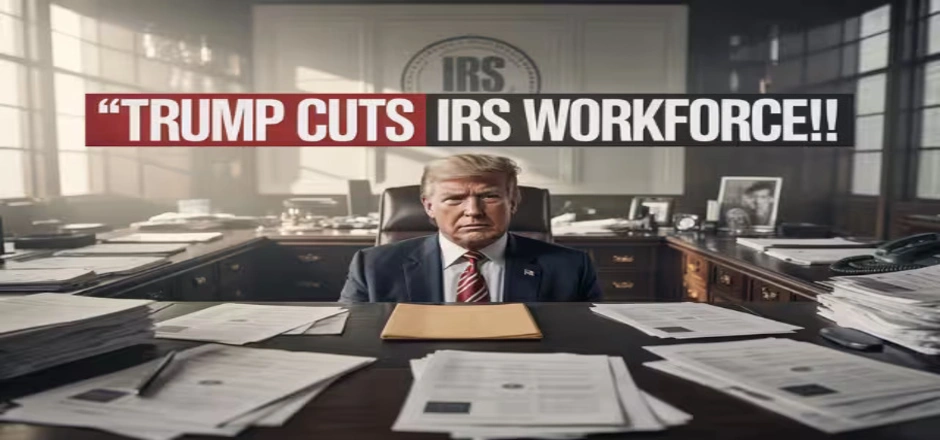The Trump administration IRS staff workforce reductions have been a much-debated topic over the past few years. These cuts, made under Donald Trump’s leadership, were intended to reduce the IRS workforce as part of more widespread government efficiency programs. While some saw it as a means of curtailing federal spending and simplifying operations, others expressed concern about what these reforms would do to tax enforcement, revenue collection, and the overall competence of the IRS.
In this blog, we’ll take a closer look at what these IRS workforce reduction plans involve, the reasons behind them, their potential consequences, and the ongoing debate surrounding their long-term impact on the country’s tax system.
Explore the Reasons Behind the Trump Administration IRS Staff Workforce Reductions
The Trump administration IRS staff workforce reductions choice was not a sudden one. Various economic, political, and administrative considerations drove this action, all of which were connected to the larger agenda of remaking federal government operations. Knowing these causes provides insight into why such a drastic reduction in one of the country’s most vital agencies occurred.
1. Federal Spending Cuts and Government Downsizing
One of the major drivers of the Trump administration’s IRS workforce reduction efforts was the administration’s aim to shrink the federal government and eliminate unnecessary expenditures. President Trump ran for office on a platform of keeping the government in line and streamlining what he referred to as “bloated bureaucracies.” The IRS, as a vast federal agency with a history of taxpayers’ and politicians’ derision, became a natural candidate for cuts.
In order to fund this mission, a number of IRS workforce reduction plans were outlined, the goal being to cut redundant jobs and lower operational expenses. These plans targeted the layoff of administrative personnel and compliance officers as specific areas in which the administration felt the cost could be trimmed without affecting necessary services, although critics said otherwise.
2. Industry Leader and Influencer Support
Interestingly, figures like Elon Musk, known for advocating minimal government intervention, reportedly supported these workforce cuts. Some discussions around Elon Musk’s IRS workforce reduction plan may harm tax collection, with critics suggesting that such reductions, endorsed by influential business leaders, would weaken the IRS’s ability to pursue tax evasion cases involving large corporations.
The view was that by contracting the enforcement branch of the IRS, high-income individuals and corporations would have an easier route to comply with tax burdens, further exacerbating the wealth gap.
3. Technological Modernization and Automation
One aspect of the rationale behind the IRS workforce cut was the assumption that technology and automation would be able to fill all those manual labor positions. The IRS had been putting money into computerized tax reporting systems and automatic auditing software, which the administration used as justification for why fewer workers would be needed in the future.
But tax professionals countered that whereas automation can execute mundane tasks, intricate audits, investigations, and enforcement actions need human judgment, which would be compromised with deep IRS workforce reduction plans and layoffs.
IRS Workforce Reduction Plans: Find the Impact on Tax Enforcement
The IRS plans for workforce reductions have resulted in a significant reduction in the number of auditors and enforcement agents. According to reports, about one-third of tax auditors have quit the agency, which has made people wonder if the IRS will be able to effectively enforce the tax laws.
This staff reduction has generated speculation over whether there will be greater tax evasion, mainly on the part of high earners and business corporations. Some specialists caution that the reduced enforcement capabilities may result in considerable tax revenue losses.
Pros and Cons of IRS workforce reduction plans
Pros
- Cost Savings: The reduction in the IRS workforce is consistent with an effort to reduce federal spending.
- Streamlined Operations: Supporters claim that a smaller IRS might mean more streamlined processes and less bureaucracy.
Cons
- Less Tax Enforcement: Fewer auditors can mean less enforcement and more tax evasion.
- Revenue Loss: Projections indicate that the IRS workforce reduction may result in up to $1 trillion in lost tax revenue within the coming decade.
- Public Trust: Notorious pardons of tax evaders and decreased enforcement can lead to a decline in public trust in the tax system.
Conclusion
The Trump administration IRS staff workforce reductions are a major federal staffing and tax enforcement approach adjustment. Though focused on improving efficiency and lowering costs, these IRS workforce reduction plans have raised alarms about their possible impact on eroding tax compliance and revenue collections. With the country still working through adjustments, the trade-off between efficient government functioning and successful tax enforcement remains of paramount concern.
Frequently Asked Questions (FAQ’s)
1. What are the Trump administration IRS staff workforce reductions?
These are the substantial reductions in IRS personnel launched under the Trump administration with a view to streamlining operations as well as lowering federal spending.
2. How will the IRS workforce cutback plans influence tax enforcement?
The diminution in personnel, specifically auditors, can cause reduced scrutiny, which could result in more tax evasion and considerable loss in revenue.
3. What are the most significant concerns regarding the IRS workforce reduction plans?
Most experts worry that IRS workforce reduction plans might undermine tax enforcement, particularly against high-income earners and big corporations. The reduction of skilled auditors is of concern regarding efficient tax collection.
4. Are there any advantages to the IRS workforce reduction plans layoffs?
Advocates of IRS workforce reduction plans layoffs, opine that it will cut down on federal spending and improve efficiency. However, the flip side is there could be a decline in tax compliance and enhanced evasion.
5. Did tax revenue decline after the IRS workforce cut?
Yes — upon executing IRS workforce cuts plans, there was a visible reduction in audits and taxation enforcement, particularly among high-income brackets, resulting in lower tax collection.
6. Why did the Trump administration seek IRS workforce reduction plans?
The Trump administration’s IRS workforce reduction plans sought to cut federal spending and eliminate what it referred to as bureaucratic inefficiencies. The action was contentious because of concerns about its effect on tax collection.
7. Did Elon Musk endorse the IRS workforce reduction plans layoffs?
Reports indicate that Elon Musk’s IRS worker reduction plan can damage tax collection since his drive for forceful government reductions led to the cuts in IRS employees during Trump’s administration.
8. Are there risks associated with IRS workforce reduction plans for the middle class?
Yes — with the IRS workforce reduction plans, fewer audits may disproportionately target lower and middle-income taxpayers, as high-end tax evasion becomes increasingly difficult to investigate without sufficiently trained agents.
Want deeper insight into how government decisions affect you? Subscribe to NewsMagToday for expert analysis, fact-based reporting, and real impact stories



